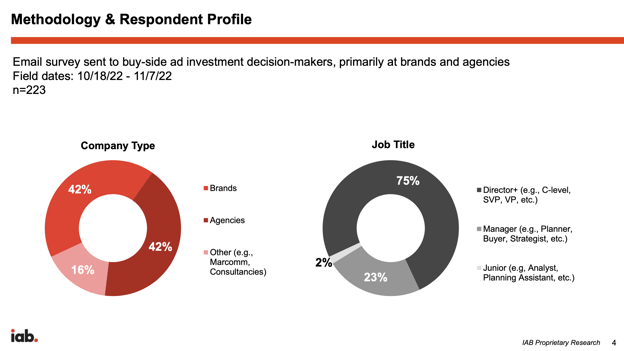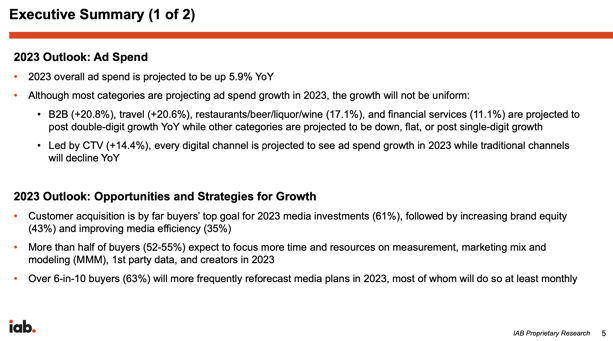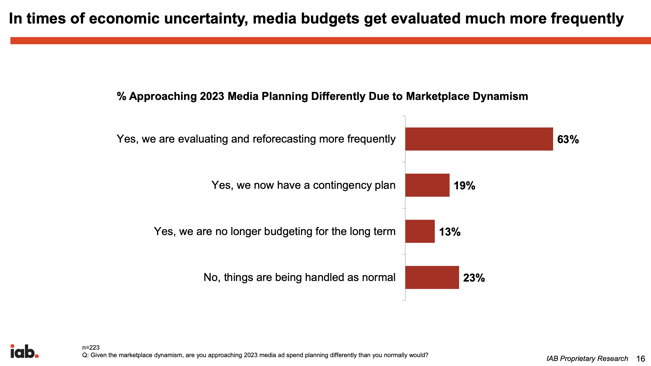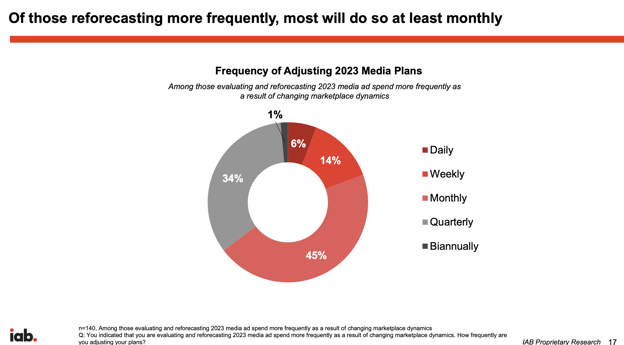Share this
Content Management System Tips Based on 2023 IAB Outlook Survey
by Kane Russell on Jan 12, 2023 11:58:00 AM
2023 Outlook
If you would like to view the complete report, you can get a copy from the IAB.
Sitting in Q1 2023, all media companies looking at investing in a content management system face recession-era economics. Ad markets started going cold in early 2022 in light of rising inflation and interest rates, which led to investment liquidity crunches, and layoffs, not to mention the return from the COVID-era content consumption (i.e. more and more people spending normal amounts of time in front of their beloved screens).
Recession economics strategy is fairly straightforward in publishing: those well-positioned with cash can invest in their business to accelerate velocity coming out of the recession. Those without cash need to invest in making their businesses more efficient in order to remain above water.
So, let’s look at the IAB 2023 Outlook Survey, published in November 2022, and see what we can learn about investing in a content management system. For reference, my credibility in analyzing this report comes only from myself and my experience utilizing content management systems for over 20+ years.
Source data from IAB

- 223 is a dynamite N from a credible, reliable source, the IAB.
- Good balance and majority of Brands and Agencies
- Only Senior Level people, who often know only enough to be dangerous about content management systems, lol
Top-level insights

- I'm Surprised: I’m surprised to see ad spend growing year-over-year to be honest. From what I can tell we’ll have to see a significant Q4'23 bump in order to expect 2023 to be greater than 2022 in terms of ad spend. To capture value, editorial folks need to create specific, unique experiences for advertising partners who authentically care about the publisher's target audience.
- Data is the 🔐 for earning revenue: the key to a content management system is to be able to give advertisers ROI-relatable data. In 2023, impressions/spots & dots aren’t enough for direct ad sales buyers. You have to drive toward showing clickthroughs, positive commentary, and emails downloaded — i.e. whatever you show as tangible proof that the advertising opportunities you create for ad partners lead to quantifiable value.
- Context matters when looking at CMS trends such as audience and revenue: The B2B statistics cited by the IAB, for example, have to be taken into context. There’s a difference between 2023 and 2022, sure, but you have to also take into account before and after COVID. With all stats showing trends over the last few years, you want to be sure that you understand not only the annualized data but also the reference points of pre and post-COVID milestones.
- People want to travel this year: From a strong content management system's perspective, spend time in Q1-Q3 saving and scheduling holiday content/content campaigns to publish according to the travel periods of you and your staff.
- Efficient customer acquisition remains the magic sauce. A strong content management system leans into this trend by providing relevant acquisition data such as revenue per page, revenue by author, or affiliate product clickthrough with and without visible programmatic ad inventory.
- The rest of the forecasted increases relate to the same trend for a content management system —> people want to see content from expert, authoritative publishers they can trust.
- With Google-approving the erosion of third-party cookies, digital will be won by publishers who can connect and track advertiser connection to people authentic to a specific category (e.g. bird watchers, hard core automotive gear-heads, foodies, cyclists, wine lovers). Over time, advertisers will stop spreading their money generally across a non-specific, non-target rich audience.
- The best content management system will allow for publishers to sponsor a content category, for example, which will be much more lucrative for forming strong ad partnerships than (for example) trying to sell around article pages being less valuable than homepage content.
Recession era economics

- Hear ad spend looks to decline: Seems like this is graph shows the decline in media advertising a bit, as I mentioned in the first bullet above.
- SEO = free traffic: For a content management system, investment has to be in technology that can create audience sustainably, i.e. by opening up organic search (i.e. free) traffic, while also monetizing continually more efficiently, i.e. via A/B testing the elements that create optimal conversion of audience to revenue.
The power of digital and owning your own data

- Eventually, teenage coders will be C-Suite: A lot of advertiser partners are still wrapping their heads around digital. Reason being that most executives now installed at advertisers did not grow up coding or engineering. It won’t be until the next generation of executives that concepts like Google, social media, and email were aspects of their entire life (vs. new mountains to climb for late-career Don Draper types).
- Distill into sensible data to avoid analysis/paralysis: The reason digital is valuable for advertisers is because it’s so trackable. Think of the difference in data quality for a sandwich shop building customer loyalty. Print, television, and radio are paper punch cards. Web, video, and podcasts are inserting your phone number at the point of sale. A content management system has to have an analytics suite that allows in-the-trenches publishers to track their progress about the type of content that’s resonating with an audience (while also providing executives top level trend information with which they can communicate to their board of directors any progress).
- Own your own data: The best content management systems will allow publishers to own their own data, rather than rely on the walled gardens of social media and other Internet giants.
Analytics are everything
- Analytics vs. reporting
- All content management systems provide reporting. A fancy way of saying a CSV file that has some information about it that seems more or less true. The game-changing content management systems provide analytics. This is where machine learning or other repeatable thinking looks at data and provides actionable solutions or ideas about how to interpret a report, or respond to a new data trend.
Content management systems are the canvas on which creators paint
- Tech and People working well together: The best content management systems are those that work in tandem with creators to unlock previously inaccessible capabilities. Things like site taxonomy matter so much in Google’s eyes when it comes to allocating credibility to domains, but taxonomy doesn’t matter unless powered by the voice and vision of a true creator, i.e. expert in his or her field of interest.
Now is the time to invest in a new content management system.
- Efficiency via modern technology: Every media company in the world is looking at making its business more efficient in 2023. One of the best ways to do that is through investing in technology. For example, a publicly traded company like Dot Dash Meredith announced that they spent around 35% of their $800MM+ in revenue on technology, of which content management is a huge piece. In 2023, the question being, can I pay less for technology that could pay me more money, soon?
Share this
- April 2024 (1)
- March 2024 (4)
- February 2024 (1)
- January 2024 (11)
- December 2023 (1)
- November 2023 (2)
- October 2023 (3)
- September 2023 (3)
- August 2023 (4)
- June 2023 (1)
- May 2023 (3)
- March 2023 (4)
- February 2023 (5)
- January 2023 (3)
- December 2022 (1)
- November 2022 (2)
- October 2022 (2)
- September 2022 (1)